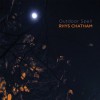Rhys Chatham, "Outdoor Spell"

At first glance, this seems like a risky proposition: Rhys Chatham, the visionary avant-garde composer known for arranging vast, expansive symphonies with 100+ guitars, has released a record made primarily with trumpet and voice. He hasn't recruited 100 trumpets and 100 voices, either—simply his own. Hell, I didn't even know Chatham played the trumpet until recently...
The truth, it turns out, is that Chatham has been playing the trumpet for nearly three decades. Feeling he had reached the limits of his creativity on guitar by the mid-1980s, Chatham began developing his voice on the trumpet, practicing only in private for the first decade. In 1993, he made his switch public, seeking collaborators to flesh out his ideas, and a few years later released a lone EP, Neon, with midi-programming whiz Martin Wheeler. (For those interested, Chatham details his long history with the trumpet in his fascinating 1998 essay, Why I Switched to Trumpet—a thoughtful, academic piece well worth a read.) This was all news to me, and as a huge fan of Chatham's innovative guitar work, my interest was piqued.
As can be expected, Chatham's trumpet playing is not virtuosic in the usual sense of the term; he would likely not fare well in a skills test versus, say, Louis Armstrong or Miles Davis. That is not to say that Chatham's trumpeting is without merit, especially given that he aims for something wholly different than his jazz predecessors. As with guitar, he brings a set of personal influences to the trumpet—atonality, minimalism, repetitive rhythms, and a strong emphasis on texture—that render his playing unique. Outdoor Spell is Chatham's first album-length release of mostly solo trumpet recordings, and it's a mixed bag with a couple stellar tracks and a couple throwaways.
The fantastic title track opens with a subtle, hypnotic drone that builds slowly throughout the piece. After two minutes, the first recognizable trumpet sounds appear—a single note at first, then many more—looping over one another, some of them fizzling into the background, others foregrounded. Chatham builds on this basic template for seven minutes; the drone and his trumpet playing then fade out. It is a subtle, confident piece of music that functions equally well as background ambience or, at loud volume, enveloping incantation, and the style is Chatham's own—layer upon layer of trumpet and voice, looped unto infinity, a paean to the gods of minimalist repetition that he invoked on "Guitar Trio," though by wholly different means. Moreover, the music shimmers and breathes, with subtle shifts in texture and harmonics that emerge beautifully on headphones.
The next two pieces introduce elements that may begin to yield fruit as Chatham explores his voice on trumpet, but are not presently as transcendent as "Outdoor Spell." The percussive, marching-band aesthetic that opens "Crossing the Sword Bridge of the Abyss" (and dominates most of its overlong 18 minutes) becomes irritating as the sounds start to resemble, quite honestly, flatulence. At times, the piece fares better when Chatham fades out the rhythmic elements mid-track and lets his trumpeting take center stage. "Corn Maiden's Rite" is essentially the shorter, more developed cousin to "Crossing the Sword Bridge"—atonal trumpet lines weaving in between scattered hits of percussion, a high-pitched squeal looming in the distance. Collaborator Beatriz Rojas guests on cajón.
The true outlier is "The Magician," which sounds like an improvisational studio session where Chatham throws the structural guidelines that permeate his better-known work out the window. Unlike his textural blowing on the rest of the album, Chatham's playing is more traditionally virtuosic than before, resembling a number of free-jazz luminaries he has mentioned were influential to developing his own style—not least among them Don Cherry, who served as Ornette Coleman's premier trumpeter during the late '50s and early '60s. Chatham also recruits Jean-Marc Montera on electric guitar (rather than simply play guitar himself—quite the statement!) and Kevin Shea on drums, who provide a lively, shifting foundation for Chatham's trumpeting. Altogether, "The Magician" is a fine end to Outdoor Spell—a flawed album bookended by two tracks well worth a listen for Chatham and trumpet acolytes alike.
Samples:




